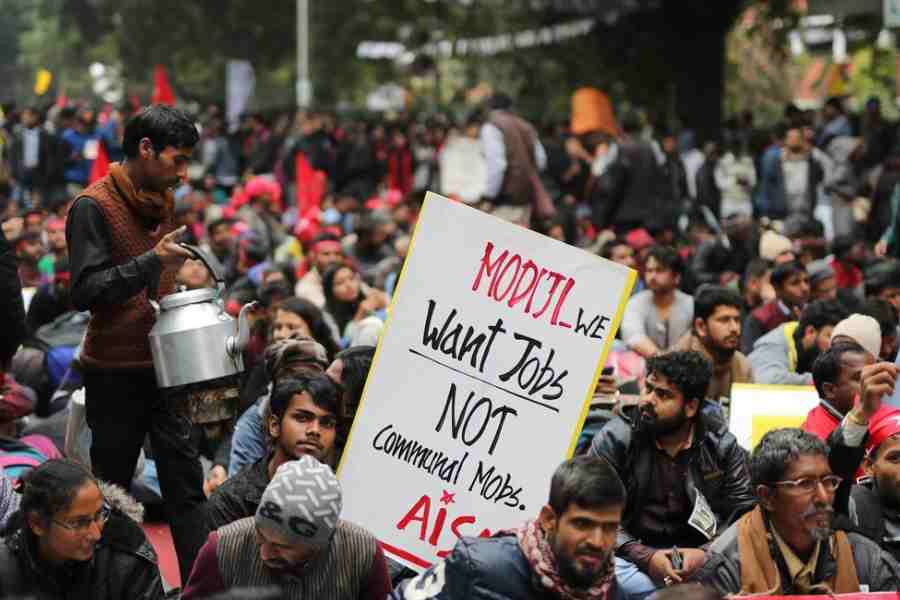An excess of imports over exports — in goods that a country is capable of producing — creates unemployment, through what is generically called ‘deindustrialization’. It also entails increased external debt; and if this greater debt is covered by larger financial inflows (officially called foreign portfolio investment) which are extremely volatile, then the country can be reduced to a ‘basket case’ in a jiffy if finance suddenly decides to leave en masse. Why, then, do countries maintain an excess of domestically-producible imports over exports, instead of proscribing such imports, if it imposes a triple burden: greater unemployment, greater indebtedness and greater vulnerability? The simple answer is that many persons in the country prefer foreign goods to the domestically-produced ones and they are against any import restrictions.
There may be good reasons for this preference: foreign goods may be cheaper, or of better quality than domestically-produced ones. Tagore in Ghare Baire, for instance, was sympathetic to the import of foreign cloth, despite its unemployment-generating effect, because it improved the living standards of the peasantry. Gandhi, in contrast, was more concerned with the adverse employment effect of such import and wanted a voluntary renunciation of foreign cloth (which destroyed, as he put it, the livelihood of “my brother, the weaver”).
A point not touched upon by either Gandhi or Tagore is that this apparent conflict of interest between two social groups may tend to disappear over time: the import-induced ‘deindustrialisation’ in colonial India threw the unemployed weavers and artisans back on to land, causing, in real terms, a rise in rents and a fall in wages in the latter half of the nineteenth century; this worsened the conditions of the very peasantry that had gained initially from cheaper imports.
The long-run congruence in interests of the gainers and losers from importing unemployment may not be as strong in the present context, since the gainers are mostly from the middle class, which enjoys access to foreign goods, and losers are from the working people who have reduced employment opportunities, and the latter’s unemployment does not much hurt the former as they belong to disjointed labour markets. Government policy, therefore, has to prioritise the interests of one group over another, and there would be general agreement that increasing employment must have priority (as Gandhi had suggested). Even the middle class, surely, would not like living in a society afflicted by mass unemployment as it promotes lumpen behaviour, crime and fascism. Restricting imports to generate domestic employment must thus be a priority for any Indian government.
There is a particularly compelling reason for this in the present context. This has to do with the crisis of the world economy which even conservative economists have started calling a ‘secular stagnation’. The prospects of export growth in a stagnant world economy are bleak; and with export growth slowing down, the overall growth rate, too, will slow down, so that stagnation would have been imported into the domestic economy within a neo-liberal arrangement. The temptation here would be to improve our country’s prospects at the expense of other third-world countries. But such a course which amounts to a ‘beggar-my-neighbour’ policy is ethically repugnant: countries of the third world must avoid playing the game of undercutting one another in the process of each making a frantic effort to grow within a stagnant world economy. But, if we do not pursue ‘beggar-my-neighbour’ policies while others do, then the magnitude of unemployment, indebtedness and vulnerability will be even greater for our country. The only course that is ethically defensible and economically superior in this context is to move away from the neo-liberal arrangement altogether and impose import restrictions (although the Narendra Modi government, true to form, is doing the opposite, negotiating free trade agreements).
Together with import restrictions, there has to be a growth stimulus provided by larger government spending. But any effort to enlarge government spending by taxing the rich, which is the only way (other than by increasing the fiscal deficit) that government spending can play its stimulus role, would trigger a financial outflow; to arrest this, controls on capital outflows have to be imposed, which would make import restrictions even more necessary. This is because any control on capital outflows would also reduce capital inflows, and if the trade deficit is not eliminated through import restrictions, it just cannot be financed. An economy where growth in government spending, rather than export growth, plays the stimulus role can legitimately claim that it is not pursuing any ‘beggar-my-neighbour’ policy (for others are free to do likewise).
All this may mean a return to a dirigiste or ‘Nehruvian’ economic strategy. Many would argue that since the country had ‘escaped’ from this strategy by adopting a neo-liberal agenda, which greatly enhanced its growth rates, a return to Nehruvian dirigisme represents a suicidal step.
Against this, however, one can make three points: first, there is no alternative before the country in the current situation of world economic stagnation, which has no prospect of ending soon (unless it pursues an unethical ‘beggar-my-neighbour’ policy at the expense of other countries). Second, employment growth under the earlier dirigiste strategy was faster than under neo-liberalism, although output growth might have been slower. Third, while pursuing dirigisme in the new circumstances, the State’s hands must be tied so that people’s well-being becomes a binding consideration for it; this can be ensured by having a set of constitutionally guaranteed, justiciable, universal economic rights, on a par with the political rights that the people currently have.
Prabhat Patnaik is Professor Emeritus, Centre for Economic Studies, Jawaharlal Nehru University, New Delhi











